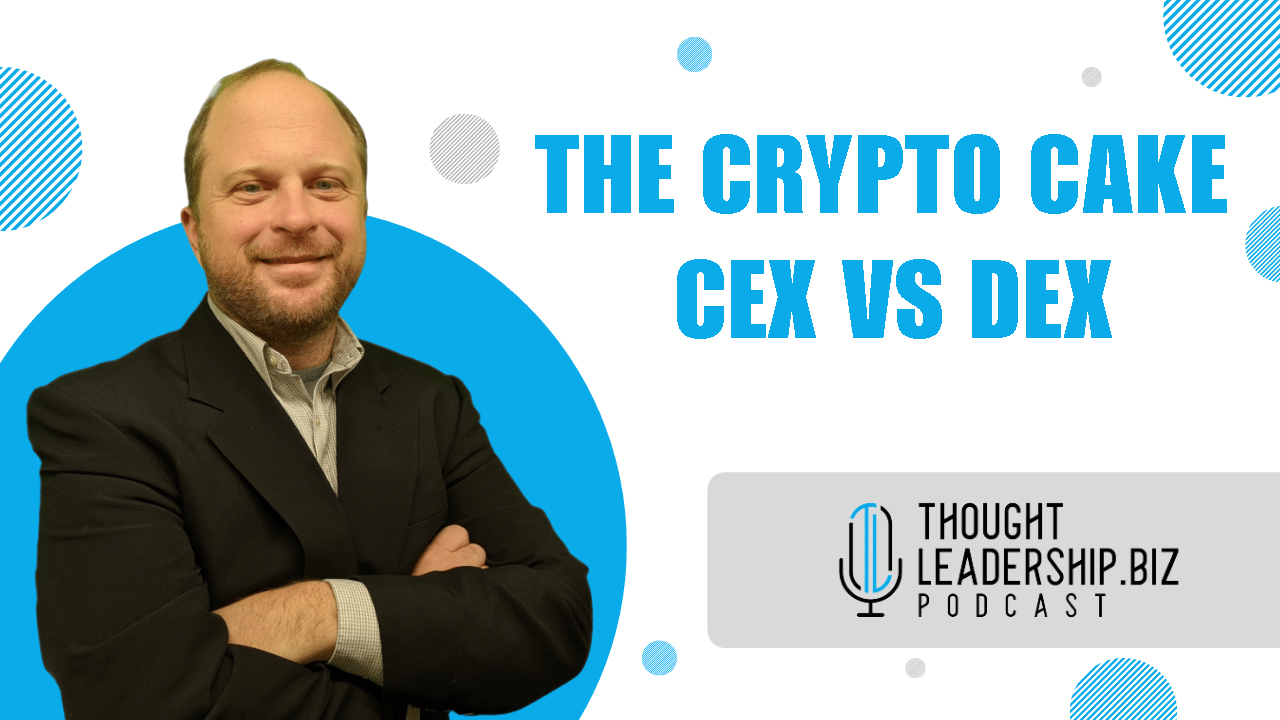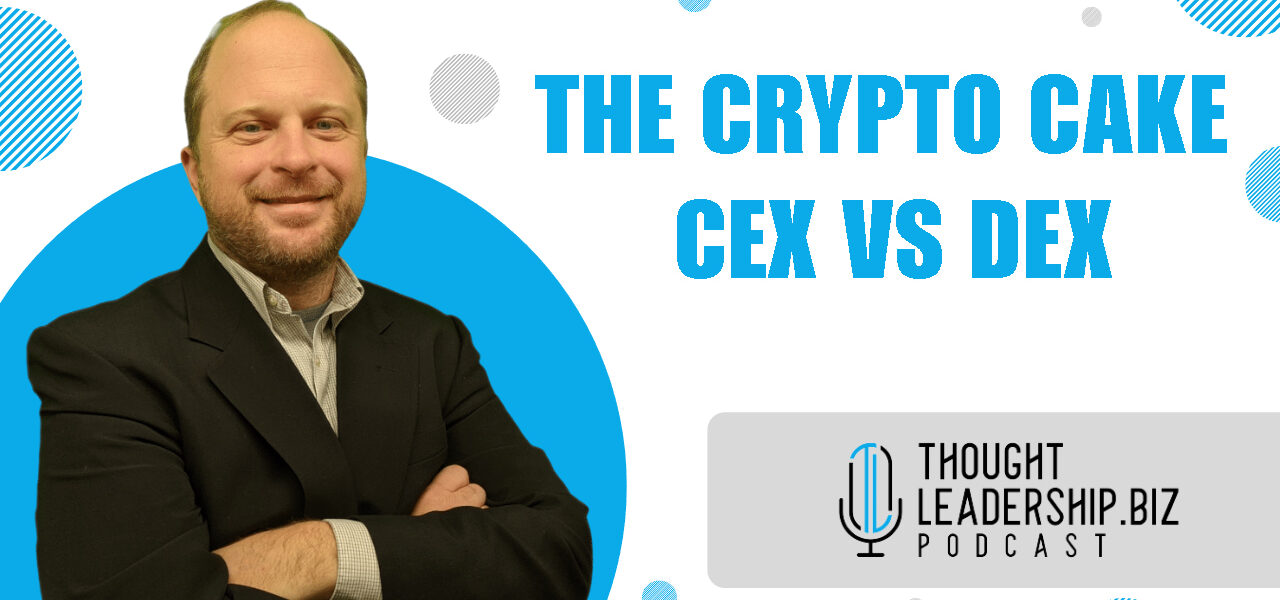With cryptocurrency, users have access to innovative digital payments that offer secure and modernized solutions. For a more user-friendly experience in the crypto space, CEXs are an easy point of entry. Additionally, customers can benefit from customer support if needed. DEXes provide advantages better suited for experienced traders who prioritize decentralization over convenience. These exchanges do not involve central authorities or third parties, thus offering enhanced security through greater personal control of funds stored and traded.
In this episode, Mr Machut will discuss the The Crypto Cake CEX vs DEX.

Read / Watch / Listen
Stream this article from your favorite podcast audio or video streaming service as referenced below.
Read: Below
Watch: The Crypto Cake CEX vs DEX
Listen: The Crypto Cake CEX vs DEX
More ways to read, watch and listen
Read the Article
The Crypto Cake CEX vs DEX
Hi everyone, and welcome to another episode of Thought leadership.biz. I’m Chris Machut, and in today’s episode we’ll be discussing the crypto art of my personal journey into cryptocurrency investing.
It’s difficult to know where to start with this one. So let me start with a story.
I don’t know about you, but when I was. I had a little piggy bank. It had a little key in everything. So cute.
Every week, I dropped my pocket money in there, locked it tight until the very next week.
No one knew where my key was. I even questioned that myself on occasion.
No one knew how much I had in there.
No one knew exactly where it was, so it was safe as a. At least that’s what I thought until little Jimmy Jones from next door stole it. One day I was devastated, but thankfully I had insurance.
Thank you, mom. She was there to save the day, and she paid me the whole $2 and 26 cents I had saved. So nothing was lost.
Apart from a friendship and of course my piggy bank, I guess that’s a little true. Only the facts may have been changed a little bit. Kind of sums up the main point and ideas for this week’s show.
First, unless you have control over your own funds, they’re not really yours. In other words, the, not your keys, not your coins kind of idea.
and second, if they get stolen, you need someone to pay them back to you or prevent them from getting stolen in the first place.
Those two points, ladies and gents, are the central element to the debate that continues to rage in the cryptocurrency space. Whether or not centralized or decentralized platforms are.
If you know something about this, I’m sure you’ll have your own thoughts on it, especially given the events that occurred in the end of 2022 with FTX,
If you don’t, well, hopefully over the next few minutes you’ll get some idea of the complexities involved and why at the end of the day it looks like you can’t have your crypto cake and eat it too.
Unless you’ve been hiding under a very large Brock, oh, for the last couple of months, you’ll have heard the horror stories about the collapse of the centralized exchange FTX. You also have seen the demonetization of cryptocurrency.
The last few weeks have seen some colossal and very public collapses in the crypto space, FTX being one of the biggest.
Over the centralized platforms like Alameda Research and her sister company Block five. Also bit the digital dust.
So what did the recent disintegrations of some of the leading crypto platforms tell us? Well, that’s a tricky one to answer because as you would expect, it’s complex.
What it does tell us, for sure, is a lack of regulation, unvetted lending and borrowing, lack of transparency and visibility, unreliability of custodial, and the nature of centralized platforms in the crypto space needs to be better understood and alternatives. Maybe decentralized exchanges, may be a balance in this equation.
The fact of the matter is that it’s easier, more convenient, and less stressful, at least on the surface for your average Joe to invest in crypto through a centralized platform or exchange.
Or C E X for short rather than a decentralized one known as a Dex or D E X for short. But it certainly doesn’t mean a centralized exchange is better as those who have invested in FTX found out at a pretty heavy cost.
FTX’s collapse has sent shockwaves through the crypto community and raised some serious issues about the reliability of the centralized ecosystem.
So the question right now is given the difficulty most newbies have with dealing with a decentralized exchange because the learning curve is so steep, but given also the serious flaws of the centralized model,
no regulation.
Which one is best or is cryptocurrency best avoided altogether, right? , as many of you will already know, stepping into the world of crypto is well pretty damn cryptic. It’s complicated, it’s confusing, and potentially crippling financially if you don’t know what you’re doing, which most people don’t. I didn’t when I first got started, which is, and I’m learning every day, which is why many lose their money, which in turn gives crypto a bad name.
The hardest choice for many newbies is they need to choose whether to go with a centralized exchange or a decentralized exchange after they’re onboarded.
Most opt for the former for centralized exchanges because they feel it’s safer and they may not have even heard of the decentralized ones, or no, they’re even available as they aren’t as well marketed for obvious reasons.
Before we take a deeper dive into all this, let’s make sure we understand the difference between a centralized and a decentralized exchange. It’s actually pretty simple.
Decentralized exchanges you would use peer-to-peer using smart contracts that give the user full control of their counts and complete transparency in terms of mechanics of the exchange.
On the other hand, centralized exchanges use platforms that allow them to exercise control over their users, but are much easier to use, which is why centralized exchanges are by far the most popular platforms used in cryptocurrency today. Although given the recent events, we might see a change in direction in that sometime soon.
All right, so let’s get back on track. So much has happened so quickly in the crypto space in recent years that choosing between the two types of exchanges has been pretty much complicated.
On the other hand, users want a platform that has no K Y C known as Know your customer Barrier. But also a platform that can guide you through every step of the process so you don’t end up crashing and burning at the first hurdle and the first time you dip your toes into the crypto market basically.
*****
Most people want their crypto cake and eat it too, but sorry folks, it’s just not possible right now. Let’s remember that the whole point of cryptocurrencies, like Bitcoin for instance, was that they coexist. Even replace the existing financial structures and systems that exist today. So by centralizing them, all you’re doing is handing back the power to the banking system and centralized entities and governments who are controlling the system itself.
The point here is not that the government and the evil overlords who are secretly robbing us blind , that’s not the case. It’s simply that cryptocurrencies and innovations that support them were designed to be autonomous and to work outside of the centralized systems. Over the last decade, we’ve seen their successes in various forms from non fungible tokens to decentralized finance, also known as Defi, D E F I.
So it’s obvious that these types of currencies can survive on their own ecosystem. However, would the latest FTX collapse and the noisy negatives, negative vibes and demonization of crypto and saying, we need to get rid of it. Is dumb. In fact, it’s absolutely ridiculous. Did we do with stocks during the global recession of the early 2000’s and 2008?
Of course not. Why not? Because it’s stupid to do so, right? The stocks weren’t to blame and neither is crypto. Don’t throw the baby out with the bath. The failure is a human one. Orbs vice President of Business Development. Rand Hammer explains it best. The latest few meltdowns are clearly a case of human failure.
These were centralized entities in which human beings had discretionary control of funds and suffered from some combination of failed investment strategy, lack of proper risk management and business procedures, or maybe just outright fraud.
So while it’s true that centralized platforms such as FTX leave the doors unlocked, and for that reason as well as several others can be considered a bad choice, it’s probably the case for that, for the foreseeable future at least, there needs to be at least an element of centralization, but that relies on human control, which is what caused the recent issues in the first place.
And this is where the waters get a little muddier,
okay? So think of it like this.
The traditional financial system is heavily regulated. It’s necessary in order to protect us from the plethora of unscrupulous actors in the financial space, and it works. We all know that, we all understand why some level of government supervision and control is essential.
The financial crisis back in 2000 and 2008 gave ample evidence of that, and make no mistake, it was a crisis, an absolute catastrophic one, not just in the US but for the world. Major banks and financial institutions around the globe were brought to their knees by the end of it all in 2008, even Lehman Brothers had filed for bankruptcy.
It was one of the most colossal bankruptcies ever in US history.
If the US government hadn’t stepped in with a handy $1.4 trillion as well, it doesn’t bear thinking about it anymore. What it does show though is that a centralized entity, such as the government, can be a step in if needed and protect the crypto market, which is obviously a good thing, and that is why some degree of centralization, even regulation is a must.
But that then raises the issue of how and how much.
Removing any kind of regulation or centralization, which is what happens programmatically through software within decentralized base platforms, opens up the floodgates to scammers and other bad actors come and go as they please. They take advantage of the excited and often greedy noobs or newbies who have no idea what they’re doing.
And there’s a lot of them.
However, having a centralized system enabling exchanging of decentralized cryptocurrencies completely defeats the point of cryptocurrency itself. Is there a happy medium? Not at the present, no. Perhaps in the future some kind of decentralized AI vetting agent will be able to determine who is genuine and who is not, or perhaps even a guide on the side within the system itself, helping people make better decisions ultimately to avoid the scammers, but that sounds as unlikely as it properly is.
To my mind right now, there are two things to think about.
- The current financial system took hundreds of years to evolve into its current form, a form, which still isn’t perfect. So the crypto market needs time to evolve too. It’s doing so at an incredible rate. So who knows what innovations will arise in the coming years.
- There needs to be a balance between centralized exchanges and decentralized exchanges. They need to be decentralized enough to be authentic in terms of what they were created to be, and they need to have an element of regulation in order to make sure that they are sustainable and most importantly ethical.
If the FTX disaster of 2022 has taught us anything, it’s that the centralized platforms will be around for a while and for as long as that happens, the government will ultimately be in control. The good side of that coin is that our funds will be protected. The bad side is that it SAPs the spirit of cryptocurrency.
Until we can find a way to combine both aspects into a single platform without devaluing the entire reason for which cryptocurrencies were developed, I guess they’ll both have to coexist peacefully side by side in the crypto sphere.
So what can you do? Well, it might sound cliche, but educate your community representatives at the city, the state, and even the federal levels, because educating the people who have the power to actually create real change is the only way that you’re gonna have your crypto cake and eat it too.
I’m Chris Mahut.
Stay safe out there.
Latest posts by ThoughtLeadership (see all)
- Episode 24 – The Crypto Cake CEX vs DEX - January 27, 2023
- Episode 23 – Blockchain Basics - December 16, 2022
- Episode 22 – Be Alpha - November 18, 2022










